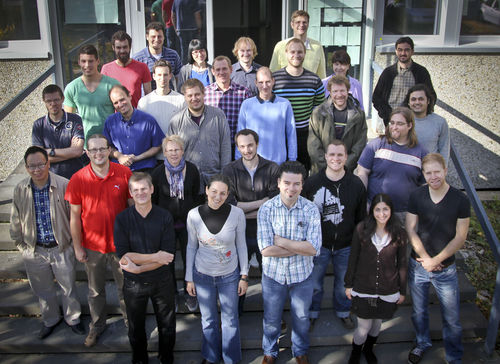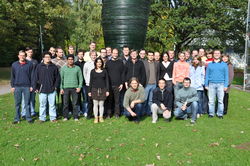Difference between revisions of "Main Page"
(→News) |
(→News) |
||
| Line 11: | Line 11: | ||
* A [[Programmieren in C++ WS 2012|block course "Programming in C++"]] will take place between '''Feb 18, 2013 and Feb 22, 2013'''. The course is open to '''all students'''. BSc Physics students can even take it as "fächerübergreifende Schlüsselqualifikation" (SQ) to obtain 3 CP. Places in the course are limited, so please register for the course as soon as possible! | * A [[Programmieren in C++ WS 2012|block course "Programming in C++"]] will take place between '''Feb 18, 2013 and Feb 22, 2013'''. The course is open to '''all students'''. BSc Physics students can even take it as "fächerübergreifende Schlüsselqualifikation" (SQ) to obtain 3 CP. Places in the course are limited, so please register for the course as soon as possible! | ||
| − | |||
| − | |||
* The ICP has moved within the university campus to '''Allmandring 3''' ([[How to find us|Map]]). Please change your address book accordingly! | * The ICP has moved within the university campus to '''Allmandring 3''' ([[How to find us|Map]]). Please change your address book accordingly! | ||
| Line 19: | Line 17: | ||
* Maria Fyta has joined the SFB716 as junior professor. She will work at ICP on multiscale atomistic and mesoscopic simulations of biologically functionalized surfaces and nanoparticles, DNA translocation through nanopores and elastic and opto-electronic properties of carbon-based materials. | * Maria Fyta has joined the SFB716 as junior professor. She will work at ICP on multiscale atomistic and mesoscopic simulations of biologically functionalized surfaces and nanoparticles, DNA translocation through nanopores and elastic and opto-electronic properties of carbon-based materials. | ||
| − | |||
| − | |||
| − | |||
| − | |||
<!-- | <!-- | ||
Revision as of 10:43, 5 February 2013

We use high-performance computing on supercomputers and parallel clusters to solve complex problems in physics that would otherwise be impossible to solve via analytical methods. Our main research areas are presently to understand the physics of soft matter systems in general, with a particular emphasis on charged systems like polyelectrolytes, charged colloids, ferrofluids and ionic liquids. In addition we are interested in various biophysical problems. The simulations are performed on parallel computers with help of the simulation package ESPResSo, and we continue to develop algorithms for long range interactions.
A second focus of our research are geometry, flow and transport phenomena in porous media and applications of fractional calculus in physics. Our methods are not only computer simulations, but we also apply numerical methods and statistical physics approaches like stochastic processes, density functional methods, and other approaches.
News
- A block course "Programming in C++" will take place between Feb 18, 2013 and Feb 22, 2013. The course is open to all students. BSc Physics students can even take it as "fächerübergreifende Schlüsselqualifikation" (SQ) to obtain 3 CP. Places in the course are limited, so please register for the course as soon as possible!
- The ICP has moved within the university campus to Allmandring 3 (Map). Please change your address book accordingly!
- On June 15, the Stuttgart cluster of excellence SimTech has succeeded in the competition for the second phase of the German Excellence initiative. Congratulations from ICP!
- Maria Fyta has joined the SFB716 as junior professor. She will work at ICP on multiscale atomistic and mesoscopic simulations of biologically functionalized surfaces and nanoparticles, DNA translocation through nanopores and elastic and opto-electronic properties of carbon-based materials.
Contact
Please note that the ICP has moved on the campus of Stuttgart University!
Prof. Dr. Christian Holm (Director)
Rudolf Hilfer Fax: 49-(0)711/685-6-3658 |
Institute for Computational Physics
Universität Stuttgart Allmandring 3 70569 Stuttgart Germany How to find us? |
Professor Holm's Office Hours: Monday, 13:15 - 14:00
Professor Hilfer Sprechstunde: Dienstag 13:00 - 13:30 JP Arnold's Office Hours: Monday-Friday, 10:00 - 17:00 JP Fyta's Office Hours: Monday-Friday, 10:00 - 12:00 |


